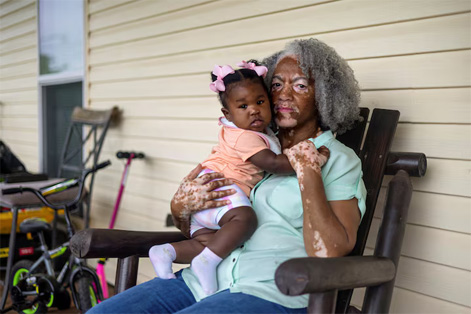|
|
|
|
|
|
 |
|
|
Lydia
Gerard,
whose
husband
died of
kidney
cancer,
sits
with her
eight-month-old
great-granddaughter
Kylee on
the
front
porch of
her
home,
located
within a
mile of
the
Denka
Performance
Elastomer
plant,
in
Reserve,
Louisiana
April 1,
2025.
(Reuters
photo) |
| |
Environmental
Justice
at Risk:
How
Deregulation
Impacts
Minority
Communities
Li Haung
-
National-Politics
Tell Us
USA News
Network
LAPLACE,
Louisiana
- Lydia
Gerard,
a
resident
of
Louisiana's
"Cancer
Alley,"
fears
for her
great-granddaughter's
future
health
due to
toxic
emissions
from
nearby
chemical
plants.
The
area, a
stretch
along
the
Mississippi
River,
is home
to
numerous
industrial
facilities,
including
a
synthetic
rubber
plant
that was
sued by
the
Biden
administration
over
alleged
health
risks.
However,
the
lawsuit
was
dropped
shortly
after
President
Trump
took
office,
as his
EPA
prioritized
deregulation
over
environmental
justice.
Environmental
justice
programs,
designed
to
protect
minority
communities
disproportionately
affected
by
pollution,
were
dismantled.
Grants
for
initiatives
aimed at
improving
living
conditions
in
underserved
areas—such
as clean
air
projects,
transit
improvements,
and
energy-efficient
housing—were
canceled,
sparking
outrage
and
legal
challenges.
Cancer
Alley
has long
been
associated
with
high
cancer
risks,
with
multiple
studies
pointing
to
elevated
health
concerns.
While
industry
representatives
dispute
claims
that
emissions
have
significantly
contributed
to
cancer
cases,
local
residents
and
researchers
cite
data
showing
increased
illness
rates
among
those
living
closest
to the
plants.
The
elimination
of
environmental
justice
programs,
combined
with
deregulation
efforts,
has
raised
concerns
among
health
experts,
former
EPA
officials,
and
community
advocates,
who
argue
that
marginalized
communities
will
bear the
brunt of
these
decisions.
Meanwhile,
business
leaders
supporting
deregulation
claim
these
changes
will
lower
costs
and
boost
energy
production.
|
|
|
|
|
|
|
|
|